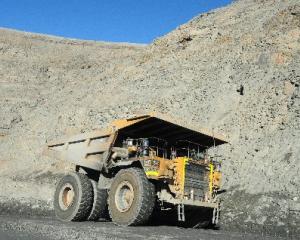Solid Energy is at a crisis point and a Government bail-out is almost inevitable, mine closures are possible and further job cuts likely in another restructuring to try to salvage the debt-ridden coal mining company.
The state-owned enterprise yesterday revealed it was in talks with its banks and the Government over its future after its debt rose to $389 million. A further ''significant loss'' would be in its half-year result.
It posted a $40 million loss last year.
Finance Minister Bill English said the banks had taken action because they were concerned about getting their money back - and he would not rule out a bail-out by the Government, saying it would not let the company fall into receivership.
He would not rule out further job losses among the workforce of 1200 and mine closures in a future restructuring aimed at returning the company to its core business of coal mining, but with much lower overheads.
Staff, suppliers and contractors would continue to be paid, but faced two or three months of ''unavoidable uncertainty'' while the banks, the Treasury and the company worked out how to restructure the company.
The Government would not just let the company collapse, he said. It could still be a viable business, but would need restructuring and lower overheads.
''The company is in financial distress. We are not going to let the company go ... there are clearly going to be discussions around whether they are carrying too much overhead and which mines are viable and which mines are not.''
Solid Energy has coal mines on the West Coast, Southland and at Huntly East, in Waikato. Last year, it bought Pike River, which has been closed since an explosion claimed the lives of 29 miners in 2011.
In a tough last 12 months, the company shed about 450 jobs.
Mr English said it would take some time to decide which parts of the company were worth keeping. The shareholding ministers had not had a role in controlling the company's debt raising. State-owned Enterprises Minister Tony Ryall said questions about the debt levels should be directed to the board.
Board chairman Mark Ford was unavailable for media interviews.
But in a statement, Mr Ford - who took over last November as part of a wholesale changeover on the board - said it was working on a turnaround plan.
''We believe this plan can provide a sustainable future business to meet expected market conditions.''
Mr English said the true condition of its books became clear only after the Treasury began a scoping study as part of the process of readying it for sale under the Government's partial asset sales programme.
The SOE was worth ''a lot less'' now than the $1.7 billion it was valued at by the Crown Ownership Monitoring Unit last year, but he did not know whether it was worth more than its $389 million debt.
Labour's state-owned enterprises spokesman Clayton Cosgrove said the Government had been negligent in its oversight of the company.
''Four years ago, this was an export award-winning company. Now, it's a train wreck. Where was the oversight and the monitoring? And what's the result?
''The poor old taxpayer gets kicked in the guts again - probably to the tune of hundreds of millions of dollars.''





